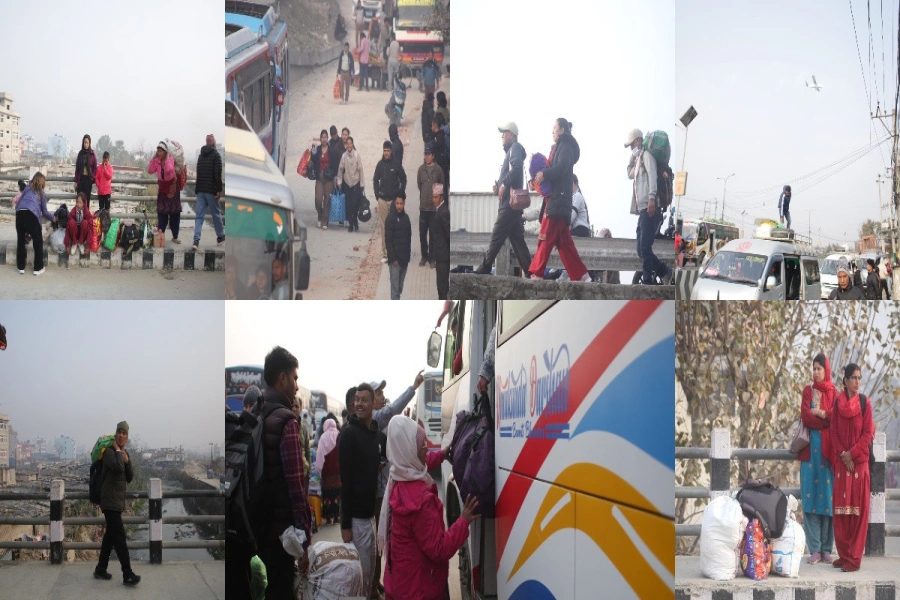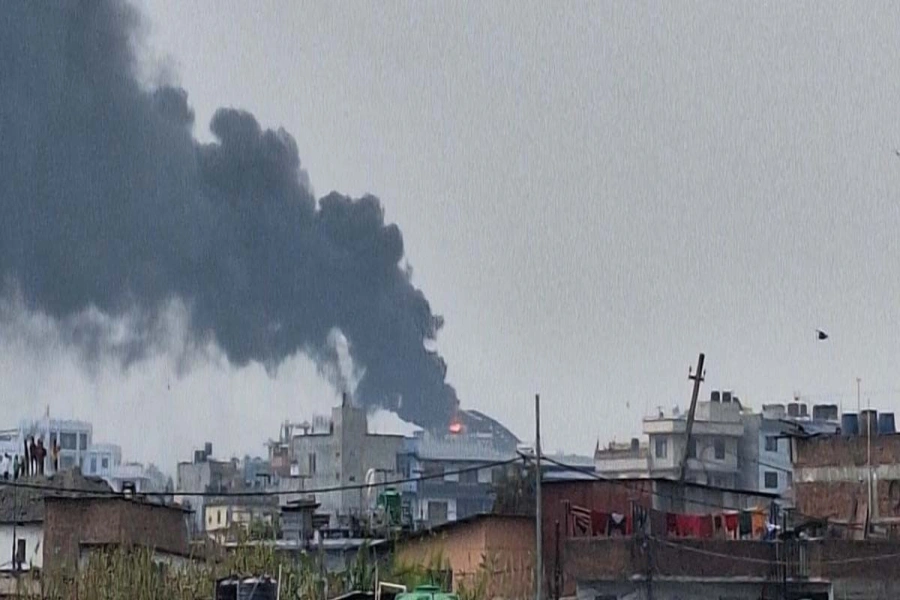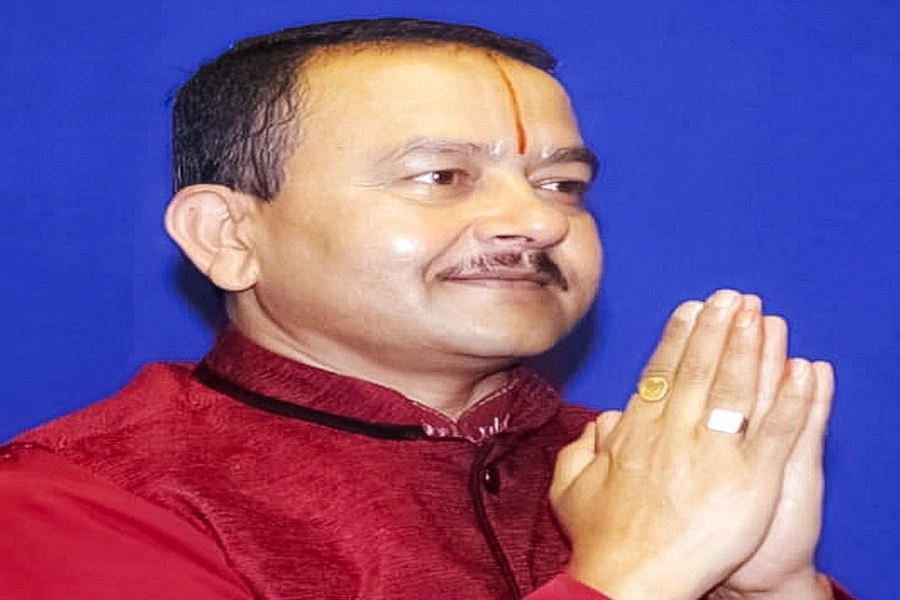Ra bhanyo
Ramro cha
Policele kabitalai ramro bhanyo
…policeharu pani
Kabita padhchan[break]
(The police read a poem
And said
It’s good
The police praised the poem
…even the police
Read poems)

Bimal Nibha is actually a poet. His statement that he can write one satire daily has become a satire in itself today. He rose to fame by writing for the ‘Chautho Column’ back in the days. A collection of his satires titled ‘Cheuko Badhshala’ won the Sajha Puraskar.
Nepali literates who write satires, more often than not, lack vigor in their personal lives. Nibha, however, is the exact opposite. He is well-known for his sense of humor at every other place. And even his commentaries on contemporary writers are comical.
At one such occasion, he said to novelist Dhurba Chandra Gautam, “I really like your novel ‘Ghurmi’, dai.”
Dhurba Chandra Gautam laughed.
Nibha became serious, “I am allowed to comment, aren’t I?”
“Why not? Of course.”
“Dai I found your new novel messy, boring and rubbish.”
Gautam’s new book ‘Ek Asafal Akhyan ko Arambha’ had been recently published. He laughed at Nibha’s comment.
Nibha added, “Dai you should read it yourself again. Even you won’t be able to finish it.”
Everybody laughed. Gautam didn’t speak.
That’s how Nibha is. He says whatever he feels. Nibha has the license to make fun of everything anywhere. That’s why he is fearless. He has spent 10 years writing satires. He lives by writing.
Sometimes he jokes about himself, “One can survive in Nepal by writing, but I have to take each and every breath with much care.”
Nibha spent his childhood in Birgunj reading Ibne Safi’s insightful books and Phantom comics. From time to time he used to go after his elders—who, bored by Ram Lila, staged modern plays—in hopes of getting a role. He once got the part of an ascetic’s disciple who had a broken hand. It was a suspense thriller—‘Sethiji Ki Hathya’.
The writer inside Nibha woke up while wondering around bare feet in the streets of Birgunj. When pen names were in vogue, Nibha created many. For instances: BK Everest, Bimal Krishna Navapunja, Bimal Krishna Udas, BK Nepali, BK Katil, Bimal Krishna Prasanna, Birgunjeli Mailo and BK Dushman.
Nibha is both fun-loving and emotional. Consequentially, while his creations are poignant his presentation is very playful and they tend to leave lasting impressions on his readers.
Sometimes he also receives threats. He shared, “You don’t believe me? Come look at my emails. I have very long threats.”
Once while returning from reciting his poem during the People’s Conflict, a policeman punched him in his face. His photograph was printed in most of the dailies. “I have written so many satires that sometimes even when I haven’t written anything, I feel that they will still be printed in the papers,” laughs Nibha, who has been living amidst threats for years.
He doesn’t feel that it’s right to simply admonish people in the name of satire. Neither are satires there for humor alone. He believes that satires make people emotional as well.
When he has to write a satire for Saturday he is all charged up until Wednesday. On Thursdays and Fridays, he disappears from his friends’ circles. “I have a laptop but I am not comfortable using it,” says Nibha, who arrives at the paper’s office on Friday noon with pages of hand written texts.
He writes with big letters on document-like long sheets which are remainders of newspaper cutouts. Nibha’s habits are classic.
On his way back from the paper’s office, he stops by the Kabi Kuna (Poet’s Corner) in New Road. He drinks tea with fellow poets. But he rarely treats people to tea. “Nibhaji is stingy,” ridicule his contemporaries.
In a similar context, I once said to him, “Everyone calls you stingy.”
“Yes…I am stingy in my use of words,” he smiled cheekily.
The friend circle of this 53 year old is slowly diminishing. There are hardly any people writing satires. The writer, who frequently chased former American Ambassador James Moriarty, recently visited his country as well. “I am going to America for six months,” Nibha had announced, but was seen back at the Kabi Kuna in a month and a half. “America is not a place for writers like me,” he had boasted, after which he published a series of satires on America.
Nibha has an entire box filled with newspaper cuttings of his articles. “So what if I have written so many satires?” questions Nibha. He mulls whether he should stop writing satires and switch over to poetry instead. Nonetheless, an addiction is an addiction, and his addiction to satires will never end.
Several dailies publish innumerable joke-like satires. Even then, people look for Nibha’s satires. There are very few daring writers like him today and his style of portraying characters is miraculous. Barbers talk intellectually. Farmers facing drought speak in his satires and so do Girija, Prachanda and Madhav Nepal.
After reading his articles, people may imagine him to be an intimidating personality, but Nibha is like a young man who beams happily looking at his newly purchased maroon shirt. He shows off his new pair of shoes to his friends and asks, “Can you guess the price?”
Nibha is very romantic. That’s why he is a die-hard fan of actress Mausami Malla. After a host of actors joined the Maoists, he expressed at a tea gathering, “I think I should join the Maoists too.”
“Why?”
“Mausami Malla has joined them too.”
Everyone laughed.
“But then I don’t think I should; I am scared,” said Nibha after a pause.
“What’s the fear?”
“The fat armed Rajendra Khadgi is also with her.”
Nibha is already a big name. Even so, when he has to get on stage his face goes red with nervousness. He may be scared of vehicles on the road, but Nibha is not scared of the state. In a glimpse, Nibha appears to be the only middle-class actor fighting against the state.
Nibha has been solely keeping up the standards of cotemporary satire. And he has prevented them from becoming mere jokes.
Four books short listed for "Bimal Smriti Puraskar"






-1200x560-1772467693.webp)
































